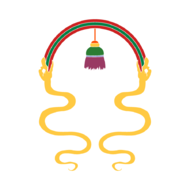Free Suyu Front
Free Suyu Front | |
|---|---|
 | |
| Founder | Hidram Cerwyn |
| Founded | 21 January 2013 |
| Dissolved | 10 June 2013 |
| Merged into | Roots Party |
| Headquarters | Salisse |
| Ideology | Anarchism (early) Environmentalism Anti-Bleuberrism |
| Political position | Far-left (factions) |
| Colors | White |
The Free Suyu Front (Sabian: jaresuiuhorói; Old Sabian: Jarəımən Cűyu Mekən), commonly known by its English initials, FSF, was an anarchist[1] movement and later an anti-bleuberrist political party in Sabia and Verona.
It was founded as a rebel anarchist group in January 2013, following the victory of the Unity Party in the 2012 general election in which Osez Kóvérsz became prime minister. On 21 January 2013, it was officially registered as a political party, and signed the Karasal Treaty becoming the third political party in the Kingdom and entering in the national unity government as mandated by the treaty.
Its name derived from Tawantinsuyu, the name used by the Inca Empire's people to refer to their nation. It was led by Hidram Cerwyn and conformed of anarchists, radicals and former members of the Socialist Party. It was mostly present in the Bal area, a predominantly Socialist prefecture. Shortly after the group's foundation, Cerwyn was declared a "threat to national security" by the Kóvérsz government, and accused of having participated in the November 2012 revolts against the government. The FSF was temporarily banned until Cerwyn signed the Karasal Treaty.[1]
The FSF was involved in a controversy when it was uncovered that Kóvérsz's Socialist Minister for Education and Welfare had been an undercover member of the FSF. Though by the time the Minister's involvement with the group was discovered, the FSF was already an official political party, Schubert-Moss' activities dated back to the foundation of the group and continued through the period in which the party had been banned by Sabioveronese authorities. Further investigation revealed the FSF had, during its time as a banned group, colaborated with the Socialist Party in anti-government activities. Schubert-Moss, Hidram Cerwyn and Napoléon Bleuberrie (leader of the Socialist Party) were all charged and put to political trial in the Courts under charges of acting against the government and violating the Karasal Treaty. Eventually, all the defendents were declared innocent.
The FSF would, even after the contoversy, nominate Schubert-Moss as their Prime Minister-candidate for the May 2013 elections.[2] It received 18.8% of the votes and two seats in the Courts, the smallest party at the time.
On June 10, 2013, a Dual Congress of the Free Suyu Front and the Strawberry Party was held, and leaders of both parties agreed to merge the FSF and XAM into a single party which would become the Roots Party. This marked the dissolution of the FSF.
Electoral results
| Election year | # of overall votes | % of overall vote | # of overall seats won | +/- | Ref. |
|---|---|---|---|---|---|
| May 2013 | 13 | 18.8% | 2 / 20
|
▲ 2 | [3] |
References
- ↑ 1.0 1.1 "FSF declared official party, Schubert-Moss in controversy". The SiV Phonograph. 22 January 2013. Retrieved 13 July 2018.
- ↑ "Rojas, Lycem and elections coming". The SiV Phonograph. 24 April 2013. Retrieved 13 July 2018.
- ↑ The SiV Phonograph May 20 Decisive: Bleuberrie sweeps the elections